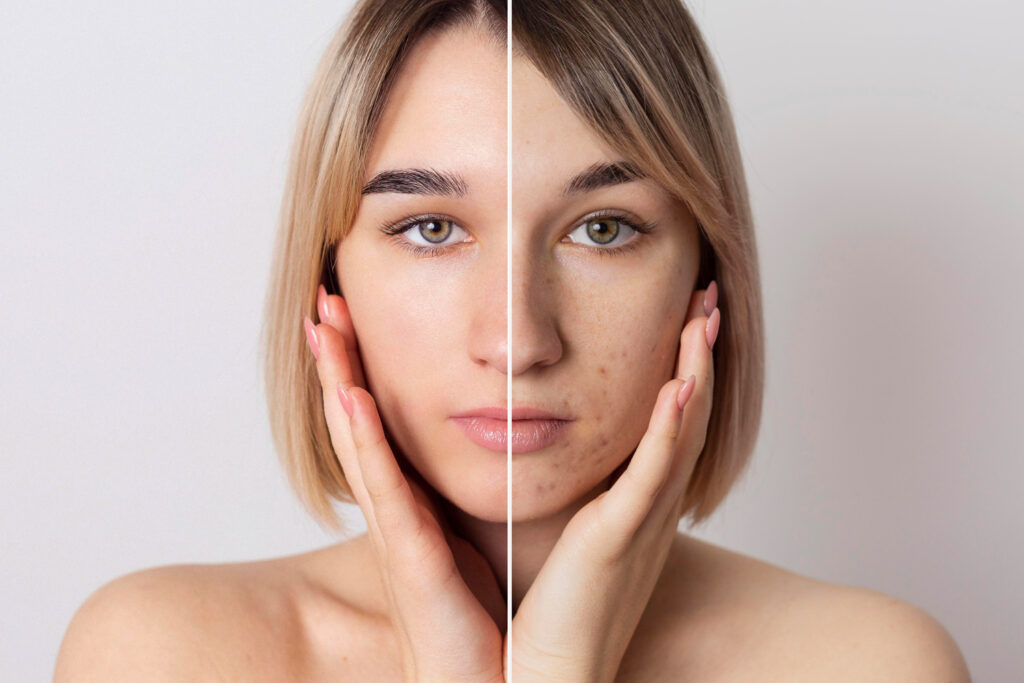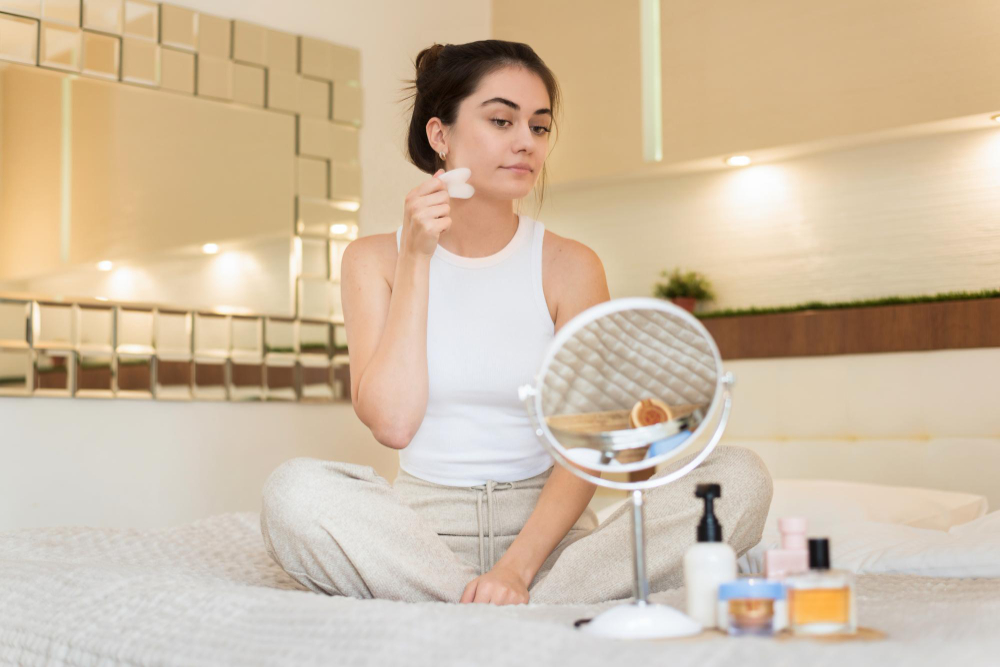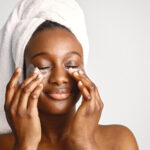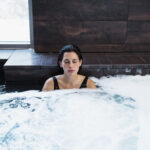How to Build a Morning and Evening Skincare Routine
Having healthy skin is not only about washing your face; it’s also about keeping your skin hydrated, addressing any specific skin issues, and shielding it from the sun and weather. A basic skincare routine should include three essential steps: cleansing, moisturizing, and using sunscreen
Morning Skin Routine
In the morning, your skin needs a little extra care to face the day ahead. A morning skincare routine is all about cleansing, hydrating, and providing protection from the elements. Here’s a guide on how to customize your routine based on your skin type.
- Cleansing: Begin by gently cleansing your face. This helps to remove any dirt or oils that may have accumulated while you were sleeping. Choose a cleanser that suits your skin type – whether it’s oily, dry, or a combination.
- Hydration: After cleansing, it’s important to add moisture to your skin. Use a light and hydrating moisturizer to replenish your skin barrier. This step is crucial for keeping your skin soft and preventing it from feeling dry throughout the day.
- Sunscreen: Protect your skin from the sun’s harmful UV rays by applying sunscreen. Sunscreen acts as a shield, guarding your skin against potential damage. Select a sunscreen with an appropriate SPF based on your skin type and the level of sun exposure you anticipate.
Customizing Based on Skin Type

For Dry Skin: If you have dry skin, opt for a moisturizing cleanser and a rich, hydrating moisturizer. Look for sunscreens with added moisturizing properties to keep your skin nourished.
For Oily Skin: Choose a gentle, non-comedogenic cleanser to control excess oil. Use a lightweight, oil-free moisturizer to hydrate without adding extra oil. Sunscreens in gel or spray forms work well for oily skin.
For Combination Skin: Find a balance by using a mild cleanser that addresses both dry and oily areas. Use a moisturizer that hydrates without clogging pores. Apply sunscreen evenly on all areas of your face
Additional Tips:
Antioxidant Boost: Consider adding an antioxidant serum to your routine. Antioxidants help combat free radicals and protect your skin from environmental damage.
Eye Cream: If you have specific concerns around the eyes, such as puffiness or dark circles, incorporate an eye cream into your routine.
Evening Skincare Routine
The evening skincare routine is a crucial part of maintaining healthy and radiant skin, focusing on repair and rejuvenation. Begin by thoroughly cleansing your face to remove makeup, pollutants, and the day’s impurities. This step allows your skin to breathe and prepares it for the upcoming treatments. Follow up with treatments tailored to your skin concerns, such as anti-aging serums, acne solutions, or hydrating masks. Night creams with ingredients like retinol or hyaluronic acid can be incorporated for added benefits. Ensure to moisturize, promoting deep hydration as your skin undergoes its natural regeneration process during the night. Don’t forget the delicate eye area, where applying an eye cream can address specific concerns like puffiness or fine lines. Consistency in your evening routine aids in repairing daily damage and supports skin renewal, contributing to a healthy and glowing complexion.
Cleanser
Washing your face at night is important to get rid of the dirt and oil that collects on your skin during the day. You can use the same gentle cleanser in the morning and at night. At night, you might need to do a bit more if you wear makeup. You can use a makeup remover or do a double cleanse to make sure your face is super clean before bedtime
Skin type Considerations:
Considering your skin type is essential for an effective skincare routine. If you have oily or acne-prone skin, it’s best to use an oil-free makeup remover or micellar water when taking off your makeup. This helps prevent clogging your pores and potential breakouts. On the other hand, if your skin is sensitive or dry, double cleansing with an oil-based cleanser or balm can be beneficial. These products not only remove makeup but also provide hydration to sensitive and dry skin, keeping it nourished and cared for.
Toner
Applying a toner to your face at night isn’t a must, but it can be helpful for certain reasons. If you have dry skin, it can add some hydration or clear away any remaining dirt after cleansing. You can even switch your regular morning toner with an exfoliating one at night. Using an exfoliating toner once or twice a week can be good to get rid of dead skin cells and keep your pores unclogged.
For dry skin, you can still use toners with hyaluronic acid or rose water at night for extra hydration. If you’re looking to control oil production, toners with salicylic acid or witch hazel can help at night. People with combination, normal, or oily skin can also benefit from exfoliating toners containing alpha-hydroxy acids (AHAs) like glycolic acid or salicylic acid.
Spot Treatments or Acne Treatments
You can keep using a spot treatment at night to eliminate pimples or reduce dark spots. For pimples, you can apply treatments with ingredients like benzoyl peroxide or salicylic acid. If you’re dealing with hyperpigmentation (dark spots), treatments containing hydroquinone or kojic acid can be beneficial.
SKIN TYPE Considerations:
Consider your skin type when using spot treatments. It’s important to avoid applying extra serums or retinol treatments to the areas where you used a spot treatment to prevent irritation. An even better approach is to alternate the nights when you use spot treatments, serums, and retinol. Additionally, you can use hydrocolloid patches at night to assist in treating open pimples while you sleep. This routine helps in managing skin concerns effectively without causing unnecessary irritation.
Serums or Acne Treatments
Including a nighttime serum or an all-over acne treatment is optional, but doing so can be beneficial in addressing acne and fine lines. However, it’s important to choose only one of these options to prevent potential irritation from too many active ingredients. Some serums also act as chemical exfoliators, helping to remove dead skin cells that can make the skin look dull and clog pores. Therefore, incorporating a targeted serum can enhance your skincare routine by addressing specific concerns and promoting a clearer and more radiant complexion
Skin type considerations:
Consider your skin type when choosing a serum. For dry skin, opt for a hydrating serum containing ingredients like hyaluronic acid, vitamin E, peptides, or ceramides. On the other hand, both dry and oily skin types can benefit from serums containing AHAs (alpha hydroxy acids) such as glycolic and lactic acid. These AHAs contribute to hydration, exfoliation, and smoothing fine lines. Additionally, they can assist in treating blackheads and pimples. If you have acne, a serum with salicylic acid or azelaic acid can be effective in unclogging pores and reducing inflammation. Tailoring your serum choice to your specific skin needs ensures that you address concerns effectively and enhance the overall health of your skin
Retinol
Retinoids, including retinol (a type of retinoid), are derived from vitamin A and are effective in treating acne and fine lines. These ingredients stimulate cell turnover and boost collagen production, enhancing overall skin texture and preventing clogged pores. Due to their potential to make the skin sensitive to the sun, retinol and other retinoid treatments should be used exclusively at night. If you’re new to retinol, start with a pea-sized amount every other night to minimize potential irritation.
Skin type considerations
Consider your skin type when selecting these treatments. For sensitive skin or mild concerns like acne, wrinkles, or hyperpigmentation, opt for over-the-counter options like retinol, retinyl palmitate, and retinaldehyde. For more severe acne and advanced anti-aging benefits, prescription retinoids such as Differin (adapalene), Retin-A (tretinoin), Aklief (trifarotene), and Tazorac (tazarotene) may be necessary. Differin (adapalene) is also available over-the-counter and FDA-approved for acne treatment.
Eyes Cream
Applying a night eye cream to the delicate skin under your eyes can provide additional moisture, aiding in skin repair and reducing fine lines. While this step is optional at night, it is particularly beneficial for an anti-aging skincare routine suitable for all skin types. The specialized formulation of night eye creams targets the specific needs of the sensitive under-eye area, promoting hydration and supporting efforts to combat signs of aging. Consider incorporating this optional step into your nighttime routine for a more comprehensive approach to skincare.
Skin type Considerations
Consider your skin type when selecting a night eye cream. Opt for formulations that contain repairing or hydrating ingredients such as retinol, niacinamide, or hyaluronic acid. These ingredients are generally suitable for all skin types, but be cautious with retinol if you have sensitive skin, as it may cause irritation. Paying attention to the specific needs of your skin type ensures that the night eye cream effectively addresses concerns, whether it’s repairing damage, providing hydration, or supporting anti-aging efforts.
Face Oil
Face oils serve as an optional yet beneficial step in your nighttime skincare routine, providing additional moisture and hydration to the skin. After applying your moisturizer, gently massage a few drops of your chosen face oil into your face and neck. This helps to lock in moisture and nourish the skin, promoting a hydrated and radiant complexion. The choice of face oil can be tailored to your specific skin needs, whether you have dry, oily, or combination skin. Incorporating face oils into your routine adds a luxurious touch to your skincare ritual and contributes to overall skin health
Skin type considerations
Choosing the right face oil depends on your skin type and specific needs. For individuals with dry skin requiring extra moisture, face oils with fatty acids like argan or coconut oil are ideal. If you have sensitive skin, consider using oils such as chamomile and rosehip oil for their soothing properties. Even for oily skin, face oils can be beneficial, but it’s recommended to opt for lighter options like jojoba or grapeseed oil. These lighter oils can help regulate oil production without clogging pores, providing a balance for oily skin types. Tailoring your choice of face oil to your skin’s unique requirements ensures optimal results and a healthy complexion.
Which Skin Type Are You?
Identifying your skin type is crucial in tailoring a skincare routine that meets your skin’s specific needs both in the morning and at night. The main skin types include normal, dry, oily, combination, and sensitive. Here’s a quick guide to help you determine your skin type:
- Normal: Balanced oil and hydration, clear of acne, and not sensitive to products.
- Dry: Lack of hydration and moisture in the skin’s barrier, leading to rough, flakey, or itchy skin.
- Oily: Excess oil production, resulting in shiny and greasy skin, often prone to acne breakouts.
- Combination: Both oily and dry, with oily skin typically on the T-zone (forehead, nose, and chin) and dry skin on the cheeks.
- Sensitive: Easily irritated skin, possibly due to issues with the skin barrier, climate, or products. This can result in itchy, red skin that may sting or burn after applying certain products.







May I request more information on the subject? All of your articles are extremely useful to me. Thank you!
You’ve been great to me. Thank you!
May I have information on the topic of your article?
yes i will post it shortly
I really appreciate your help
Thank you help me to promote my website
Thank you
Great content! Super high-quality! Keep it up!
Thank you for your articles. They are very helpful to me. Can you help me with something?
SUre how i can help you?
Good web site! I truly love how it is easy on my eyes and the data are well written. I am wondering how I could be notified whenever a new post has been made. I’ve subscribed to your RSS which must do the trick! Have a nice day!
yes thank you i am keep working on it
but do check on my website will be thankfull
I’d like to find out more? I’d love to find out more details.
Sustain the excellent work and producing in the group!
Sustain the excellent work and producing in the group!
We would also like to say that most of those who find themselves without the need of health insurance usually are students, self-employed and people who are without a job. More than half on the uninsured are really under the age of Thirty five. They do not experience they are wanting health insurance since they’re young and also healthy. Their own income is normally spent on property, food, plus entertainment. Some people that do work either entire or as a hobby are not presented insurance by way of their jobs so they go without due to rising cost of health insurance in america. Thanks for the tips you reveal through this website.
Hello.This article was extremely motivating, particularly since I was searching for thoughts on this matter last Wednesday.
Hi, i believe that i saw you visited my blog thus i return the prefer?I’m trying to to find issues to improve my website!I guess its good enough to use a few of your ideas!!
Thanks for sharing. I read many of your blog posts, cool, your blog is very good.
Your article helped me a lot, is there any more related content? Thanks!